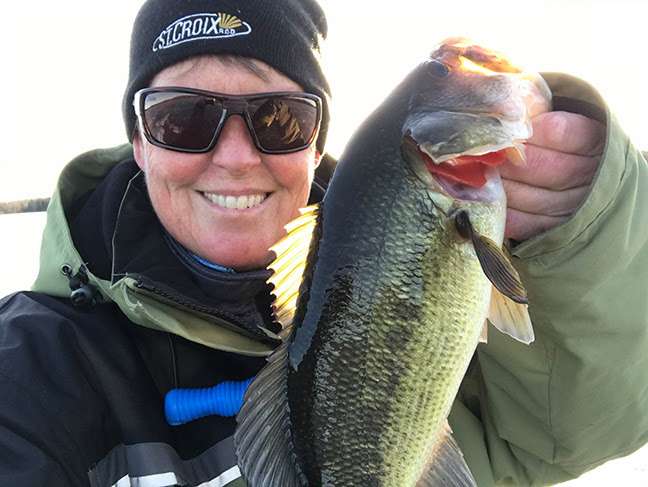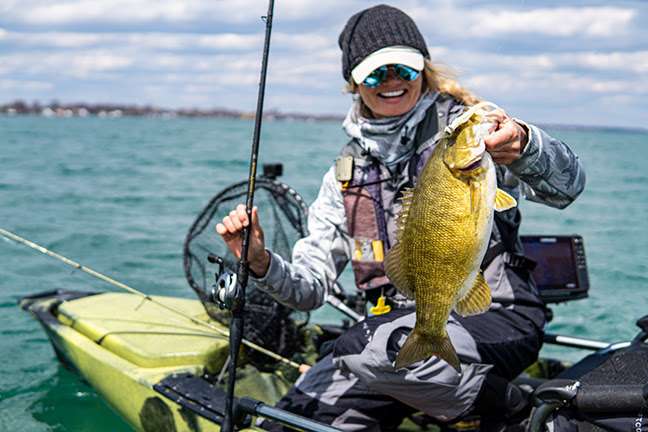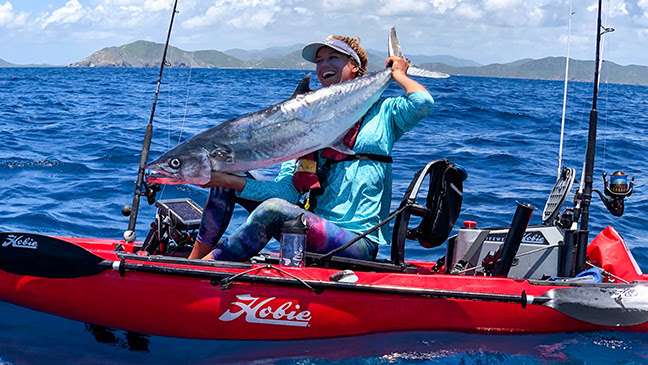
PARK FALLS, Wis. – The events of the past few months have redefined “normal” for almost everyone. Many have found it difficult to adapt. But for women who have spent years in the fishing industry, challenges and obstacles are things they’re accustomed to facing and well equipped to tackle.
Michigan native and angling veteran, Barb Carey, is no stranger to life’s ebbs and flows. A retired police officer, mother, educator, outdoor communicator, USCG-licensed charter captain and founder of WI Women Fish, Barb is used to having very little free time. When it recently became much more abundant, she was able to slow down and rediscover her own backyard.
“COVID-19 stopped me in my tracks,” says Carey. “I got reintroduced to my house and my immediate surroundings. It was the first time I have slowed down since I can remember. I am discovering new fishing spots in my neighborhood I never knew existed, because I never had time to look for them.”
At home in Central Wisconsin, Barb is fortunate to have access to exceptional spring fishing, which is something she no longer takes for granted. “The walleye run is practically in my backyard, so I’ve been able to sneak out in the boat and have a great time vertical-jigging.”
St. Croix’s Eyecon series are Carey’s go-to rods for walleye, not only because of their performance, but also due to the sentimental value they hold. “Whenever I pick up one of my Eyecons, it brings back memories of teaching my gals how to jig,” says Carey, referring to the hundreds of women she has been able to teach and mentor on the water at WI Women Fish events over the years. “After struggling to feel the bite with their own rods, I hand them over the Eyecon and soon there is this ‘AH HA!’ moment that happens when they can actually feel the walleye suck in the minnow. The fish gets hooked and so do they.”
When targeting spring river walleyes, Barb focuses in on gravel and relies on feel. “I rig up a sliding weight with a hook and a minnow or a fly. I work the rod with gentle sweeps and feel the weight rise up off the bottom. I can feel if that weight is hitting gravel, mud, rock or sand. Finding those spots with gravel makes for a day of great fishing, and the sensitivity in the rod is what helps to find the spot within the spot.”
When it comes to bass fishing, Captain Barb drills down on one of her favorite techniques. “St. Croix offers a 6’10”, medium-light power, extra-fast action spinning rod in many of its different rod series, which is a really excellent choice for fishing the Ned Rig,” says Carey, who points to the Mojo Bass version (MJS610MLXF) as a standout choice. “When I teach new anglers to fish, I steer them towards products that strike a balance between performance and value, and techniques that produce results. The Ned Rig is one of those techniques… I call it the ‘sandwich bite’ because it’s hard for me to even take a bite of my sandwich when someone’s in my boat fishing the Ned Rig!” continues Carey, who uses hi-vis mainline paired with a fluorocarbon leader for Ned Rig-fishing so she can watch the line and help her students understand when they have a bite. “It’s easy to teach, easy to fish, and provides a great means for someone to experience a lot of bites. And the 6’10” medium-light extra-fast Mojo Bass rod is just ideal. It has great sensitivity and medium-light power is perfect, because that extra-fast tip provides immediate access to that power,” she says. “It’s an important part of an overall system designed to create the most-rewarding fishing experiences for my students.”
When Barb isn’t fishing, she remains firmly focused on her mission of introducing more women to the sport. Along with founding WI Women Fish, Barb has put on numerous events designed to teach women how to fish across the country and communicates through many forms of media. “I am thrilled to see the surge of women anglers hitting the water,” she says. “I see women gain self-confidence through this sport and that carries over to other areas of their lives.”
When asked what advice she would give someone just getting into the sport, Carey suggests that they take their time and do their best to just enjoy the experiences and the process. “Figure out what your goals are. Spend time on the water improving your skills. Don’t ask for the answers that are going to be on the test but study the lessons and develop the instincts to continually improve. That’s how anyone becomes a better angler. And make it a point to support each other. We are better together and it is not a competition.”

Longtime St, Croix staffer, tournament angler, Master USCG Captain and entrepreneur, Cheryl Smith, found herself hooked on fishing at a young age. “I started fishing at 6 years old. I remember playing in my backyard and seeing my neighbor bring his tackle box out to the back stoop of his house,” recalls Smith. “I just had to see everything inside up close. I ran over and was so intrigued by all of the lures and the jar of blood worms he had. I felt like this was something I had to do.” Soon after, Cheryl asked her parents if they could go fishing. “They called my grandpa and that was it,” Smith continues. “I caught my first sunfish and I was literally hooked. As soon as I was 16 and got my driver’s license, I went to a local store and bought my brother and I fishing combos. We went out on local ponds and started figuring things out on our own.”
Like many who work in the outdoors industry, Cheryl spent years in the corporate world, owning and operating a hair salon for 18 years before selling her business to spend more time pursuing her outdoor passion. With her normal spring calendar of fishing seminars and industry shows now canceled or postponed, Smith is taking advantage of the down time by rekindling that passion.
“My trade-show season and seminar schedule came to a screeching halt,” Smith says. “It was tough to slow down after such a fast pace, but I’ve been enjoying time with my husband and my Jack Russell Terrier, Teddy. I do miss seeing my parents,” continues Smith, who says she has been staying busy fishing almost every day. “I started out fishing local ponds and the warmwater discharges on the Fox River near my house, then it was time to get out on the boat. So far, I have been chasing down a lot of smallmouth, largemouth and panfish, but I’m really looking forward to the time when I can get out with my fishing partner and start preparing for our World Walleye Association (WWA) tournaments.”
Cheryl fishes almost all of St. Croix’s distinct rod series and relies on a variety of different powers, lengths and actions to deliver the performance advantages her tournament fishing demands.
“Some great picks in the Eyecon series for walleye are the 7’6”, medium-light power, extra-fast action (ECS76MLXF) model for pitching jigs and blades and the 6’3”, medium-light power, extra-fast action (ECS63MLXF) model for vertical jigging,” says Smith, who points anglers towards a 7’, medium-light power, fast action (S70MLF) spinning rod – available in many different St. Croix rod series – as a super choice for most finesse plastics techniques for bass.
“St. Croix’s expansive, made-in-the-USA Premier series delivers a can’t-miss combination of high performance and value for any angler,” she offers. “There are good reasons why Premier has been the most popular US-built fishing rod for decades… and with over 80 different spinning and casting models available for everything from panfish to musky, there’s a strong, sensitive and powerful Premier rod for any fishing situation. And the fact that all these rods are designed and handcrafted in Park Falls, Wisconsin… well, it just doesn’t get any better than that!”
Smith uses her experiences and insights to encourage other women entering the sport. “Keep your passion alive!” she says. “If you love it, do it, but be prepared to work for it. If you don’t know the answers, ask someone who does.” She also emphasizes the need to focus less on the label and more on the angler. “I would personally rather the focus more on ‘angler’ than on ‘female angler’. It’s pretty obvious that we are female. I think because of the focus on the ‘female’ part of it all, some women are entering the sport and the industry with a false idea that they will skyrocket to the top because they some kind of unique commodity by virtue of their gender alone. No matter who you are – female or male – you will be respected when you earn your spot. I think that’s something we can all agree on. With everything in life, you need to earn it, put in the time and gain the respect. I think many of us have done that and those who have tend to enjoy longevity in both the sport and the industry. If your goals are driven by a passion for fishing and knowledge and you put in the work, you’ll succeed and the support will be there from your fellow anglers and industry leaders.”

Uncertain times have caused tournament kayak angler, Kristine Fischer, to take her life on the road and temporarily “park it” in the Appalachians. “This was strategically planned,” Fischer says. “I knew finding a remote area that might not be subject to as many restrictions was going to be key to being able to continue to my lifestyle.”
That lifestyle was fostered at a young age for Kristine. Being born and raised in a fishing, outdoors-oriented family played an important role in developing her love for the sport. “We didn’t have TV growing up, but being raised in a small town, we had access to farm ponds, creeks and the woods. My fondest memories include a paddle boat, milk-jug anchor and a tackle box full of Len Thompson spoons chasing pike on the Boundary Waters with my younger brother. After working my first full summer at 14, my first purchase with that hard-earned coin was actually a small, two-seater jon boat.”
Like Carey and Smith, Fischer forfeited the security of a corporate job to become an entrepreneur, which eventually led to the launch of a full-time fishing career. “I’ve been competing on the national kayak tournament trails for three years. I typically have 20 tournaments a year all over the country, so much of my time has revolved around that schedule. I was literally living on the road,” says Fischer, who is embracing the change of pace. “It’s been a blessing in disguise,” she says. “I have been able to slow down from my normal pace of 100 mph and focus on other aspects of the sport I’ve been neglecting, such as fly fishing, river fishing, and my favorite, musky fishing.”
One would find a variety of different rods inside Fischer’s Hobie kayak on any given day; the specific mix being dependent on where she’s fishing and what she’s targeting. The one she finds herself using most frequently, however, is the 7’4” heavy power, fast action casting rod (C74HF), which St. Croix makes available to anglers in a variety of series spanning multiple price points, including the popular Mojo Bass series. “I own several,” she says. “It’s a versatile rod that’s always in rotation during tournaments. It’s an exceptional swim jig rod, but I also use it for frogging and offshore fishing.“
Fischer’s goal has been to rewrite the stereotype when it comes to women in fishing, and despite the overwhelming support, she too has faced the occasional setback. “Whether professionally or socially, I’ve most always been operating in a male-dominated world, so that’s never really been my issue,” she says. “The struggle has always been having to prove myself. It’s like the kid who is forced to switch schools all the time and is constantly having to reintroduce herself. You’re almost automatically disregarded until you prove yourself… over and over again… but that’s okay, because it builds not only a stronger reputation, but also a stronger character.”
Last fall, Fischer helped found the Worldwide Women’s Fishing Federation in hopes of encouraging more women to get into the sport and – more importantly – give them the skills to do it on their own. “For a long time, I didn’t want to be looked at as a female angler,” Kristine says. “I almost despised it when articles would focus on that part of it. But after my big win on Kentucky Lake in the Hobie Bass Open Series, the outpouring of support from women all over the world helped me realize it’s bigger than me. If they see that I can do this, they know that they can too.”
Via the WWFF, Fischer offers classes and other programs that teach women everything from tying knots to reading electronics. “It’s great to see the genuine passion for the sport in so many young women,” she says. “I believe the future is bright, and the perception of women in fishing is continuing to change for the better.”

Turning towards the saltier side of angling, St Croix pro, Bri Andrassy, sheds some light on her roots. “I grew up by the Jersey shore, and my parents and grandparents loved fishing. I caught my first keeper flounder at the age of three on a kids’ Mickey Mouse rod, and I’ve been hooked ever since,” Bri says. “I moved to South Florida for nursing school when I was 19 and was immediately amazed and captivated by the world of saltwater fishing. I started researching the local fish, tackle, bait, rods and reels, and spots. Learning how to fish Florida saltwater was a hard but rewarding process,” says Andrassy, who emphasizes the importance of taking kids fishing. “My parents and my grandparents inspired me to fish, and as adults, we can do the same thing.”
The pandemic presented an entirely different set of challenges for the Florida angler, who also happens to work as a Doctor of Nursing Practice. “Fishing has become extremely challenging with COVID-19. I want to help enforce the safety precautions and regulations our government is putting out, and it seems preferable with the current news to stay home as much as possible, but as a professional angler, I also want to fish, so I often feel like I’m between a rock and a hard place. Fishing solo is currently a good social-distancing practice, but getting on the water with the beach and ramp closures has been the tough part.”
Bri enjoys primitive camping, lobstering, and spearfishing in addition to fishing. “My favorite St. Croix rods are the Legend Xtreme Inshore Series and the Mojo Jig rods. For me, they cover every application and need I have out on the water.”
Andrassy continues to see a positive future for women in the sport, but also sees room for improvement. “When it comes to the marketing side of women in the sport, I have seen it done well and I have seen it done poorly. It would be helpful if more companies would portray women as competent and autonomous individuals, and that more women would show their genuine love for fishing on and off camera.”
Andrassy offers advice for the up-and-coming women out there: “Don’t feel intimidated. It’s ok to not know how to do something at first. Ask questions and don’t let anyone talk down to you. Know that there will be ones that get away, but the joy you experience when you catch a nice one will overshadow the feelings of defeat. And for the young girls, this is not a boy’s sport; don’t be scared to show your love for fishing. Stand out, be ‘different’ and catch fish!”
St. Croix is proud to have Carey, Smith, Fischer, Andrassy and many other outstanding anglers on its pro staff. It’s a two-way relationship that helps to support them as anglers while they help to promote awareness of the St. Croix brand. Additionally, the critical platforms and voice these pros have built – and continue to build – are helping to foster increased participation, expanded access, and equality in the ranks of the angling community.
Barb Carey
Instagram: @icefishher
YouTube: @wiwomenfish
Facebook: @captainbarbcarey
Cheryl Smith
Instagram: @odgoutdoorgirl
YouTube: @OdgOutdoorgirl
Facebook: @CherylSmithODG
Kristine Fischer
Instagram: @midwestfishergal
YouTube: @KristineFischer
Facebook: @kristinefischerfishing
Bri Andrassy
Instagram: @ba_fishing_=
YouTube: @BAFishing
Facebook: @briandrassy
